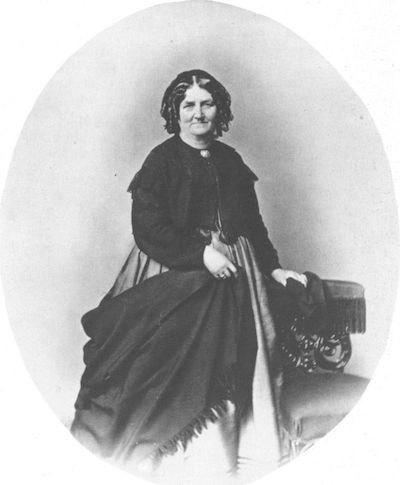
If Wagner was the cultural and musical chronicler of his time, if he remained a revolutionary activist, he had also gone into the act of police, and if he was finally his master of Bayreuth celebrated as the one of the major artist of his At the time, the illustrious composer did not live before a man made of chair and blood, animated by passions, with a sometimes violent, sometimes facetious, and sometimes tender character.
SCHNORR VON CAROLSFELD Malvina (born Garrigues)
(born on 7. December 1825 – died on 8. February 1904)
Malvina Garrigues, later Malvina Schnorr von Carolsfeld was a Portuguese operatic soprano who was born in Denmark and made her career in Germany. She and her husband Ludwig Schnorr von Carolsfeld created the title roles in Richard Wagner’s Tristan und Isolde in 1865. Her given name also appears as Malwina and Malwine but Malvina is the correct spelling.
Eugénia Malvina Garrigues was born a Portuguese citizen in Copenhagen, Denmark, the daughter of the Portuguese consul there, João António Henriques Garrigues (Jean Antoine Henri Garrigues), and his German wife of French descent (Nanette Palmier). Portugal’s Queen Maria II assigned her father as consul to Denmark by decree of 17 November 1825. She was great-grand-niece of David Garrick. Her first cousin was Danish-American doctor Henry Jacques Garrigues.
She studied in Paris with Manuel Patricio Rodríguez García.
She made her debut in Giacomo Meyerbeer’s Robert le diable in Breslau in 1841, where she sang until 1849. From 1849 to 1853 she worked at the ducal Hoftheater at Coburg, and in Gotha and Hamburg. In 1854 she was engaged by the Karlsruhe Opera, where she met Ludwig Schnorr von Carolsfeld, who was ten years her junior. They appeared there together in such operas as Les Huguenots. They became engaged in 1857 and married in April 1860. The same year they were engaged by the Dresden Court Opera.
After conducting 70 rehearsals of his Tristan und Isolde in Vienna and still finding the singers wanting, Richard Wagner turned to Malvina and Ludwig Schnorr von Carolsfeld to create the roles. The premiere was set for 15 May 1865 in Munich, but had to be postponed to 10 June owing to Malvina’s hoarseness.
After Ludwig’s sudden and untimely death at the age of 29 on 21 July 1865, only six weeks after the premiere, Malvina sank into a deep depression and never sang again. She took up spiritualism, and was influenced by one of her mediumistic pupils to believe she was destined to marry Wagner. This caused her to be deeply jealous of Cosima von Bülow, who was living openly with Wagner at Tribschen, and she tried to create a rift between them.
She later taught singing at Frankfurt; her pupils included Heinrich Gudehus and Rosalie Miller.
Malvina Garrigues Schnorr von Carolsfeld also wrote a small number of songs dedicated to Jenny Lind, to texts by Heinrich Heine and Lord Byron. She published some poetry by herself and her husband.
She died in Karlsruhe in 1904, aged 78, was cremated in Heidelberg, and her ashes are located in Dresden.
She has been the subject of a one-woman stage show, O, Malvina!, created by Dame Gwyneth Jones, who also played her in the 1983 film Wagner.
(source: Wikipedia)
This article does not yet exist in the language you requested.
If you wish to share with us your knowledge on this subject and thereby enrich our collection, please feel free to contact us to join our editorial team.
In the meantime, we invite you to discover this article:
– in its French version;
– in its German version;Thank you in advance for your collaboration.
If you wish to share further information about this article, please feel free to contact us !
